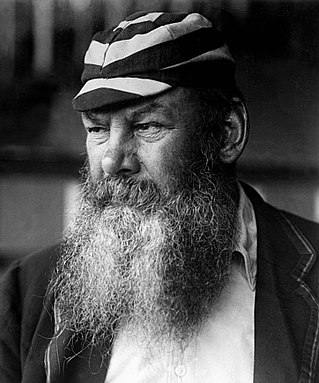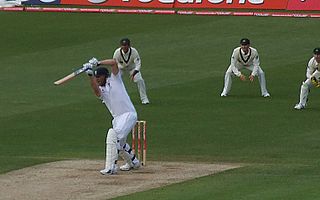
William Gilbert Grace was an English amateur cricketer who was important in the development of the sport and is widely considered one of its greatest players. He was nominally amateur as a cricketer, but he is said to have made more money from his cricketing activities than any professional cricketer. He was an extremely competitive player and, although he was one of the most famous men in England, he was also one of the most controversial on account of his gamesmanship and moneymaking.

An all-rounder is a cricketer who regularly performs well at both batting and bowling. Although all bowlers must bat and quite a handful of batsmen do bowl occasionally, most players are skilled in only one of the two disciplines and are considered specialists. Some wicket-keepers have the skills of a specialist batter and have been referred to as all-rounders, but the term wicket-keeper-batter is more commonly applied to them, even if they are substitute wicket keepers who also bowl.
Cricket is a sport that generates a variety of statistics.

George Frederick Grace was an English first-class cricketer active from 1866 to 1880 who played for Gloucestershire and the United South of England Eleven (USEE). He played in one retrospectively recognised Test match for England. He was born in Downend, near Bristol and died in Basingstoke, Hampshire. A right-handed batsman who bowled right arm fast roundarm, he appeared in 195 matches that are generally rated first-class for statistical purposes. In these matches, Grace scored 6,906 runs with a highest score of 189*. An outstanding fielder and occasional wicket-keeper, he held 170 catches and completed three stumpings. He took 329 wickets with a best performance of eight for 43.

George Arthur Davidson was an English first-class cricketer who played for Derbyshire between 1886 and 1898 and for Marylebone Cricket Club between 1888 and 1898. A useful all-rounder, he scored over 5500 runs and took 621 wickets in his first-class career.
Stewart James Storey is a former English cricketer. He was an all-rounder, a right-handed middle-order batsman and right-arm medium pace bowler as well as being a fine slip fielder. He played for Surrey from 1960 to 1976, winning the County Championship with them in 1971, and subsequently appeared for Sussex in 1978. He was readily recognisable on the cricket field by his fair hair.
James Coupe "Jem" Shaw was an English professional cricketer who played for Nottinghamshire from 1865 to 1875 making 115 appearances. According to WG Grace, few bowlers had a better record.
W. G. Grace is believed to have considered retirement from cricket before the 1878 season after he was seriously injured in a shooting accident the previous autumn which nearly cost him the sight of an eye. Having recovered, he reconsidered and in 1878 played in 33 matches, 24 of which are generally recognised as first-class. His main roles in the season were captain of Gloucestershire County Cricket Club and both match organiser and captain of the United South of England Eleven (USEE). In addition, he represented Marylebone Cricket Club (MCC), the Gentlemen in the Gentlemen v Players fixture and the South in the North v South series. 1878 was a cold, wet summer and not one of Grace's better seasons as a batsman, but he was very effective in such conditions as a right arm medium pace roundarm bowler and completed a sixth successive "double" by scoring 1,151 runs and taking 152 wickets in the recognised first-class matches.
W. G. Grace established his reputation in 1864 and, by 1870, was widely recognised as the outstanding player in English cricket.
W. G. Grace played in 31 matches in the 1895 English cricket season, 29 of which are recognised as first-class.
Following his "Indian Summer" in 1895, W.G. Grace continued to play first-class cricket through his fiftieth birthday in 1898 and finally severed his connections with both Gloucestershire and England in 1899.
W.G. Grace was mainly associated with the new London County Cricket Club during this period. His first-class career ended in 1908 when he was nearly 60.
Following his father's death in December 1871, W. G. Grace increased his involvement with the United South of England Eleven (USEE) in order to provide more income for his mother, with whom he and his younger brother Fred were still living. Grace continued to play regularly for Gloucestershire and Marylebone Cricket Club (MCC) and, when required, by the Gentlemen. In the late summer of 1872, he toured North America with a team of players who all had amateur status. In the 1873 season, he performed his first season "double" of 1,000 runs and 100 wickets.
W. G. Grace played in 32 matches in the 1871 English cricket season, 25 of which are recognised as first-class. His main roles in 1871 were as captain of Gloucestershire County Cricket Club and as both match organiser and captain of the United South of England Eleven (USEE). In addition, he represented Marylebone Cricket Club (MCC), the Gentlemen in the Gentlemen v Players fixture and the South in the North v South series.
Having toured Australia the previous winter, W.G. Grace's team landed in England on 18 May 1874 and he was quickly back into domestic cricket. The 1874 season was very successful for him as he completed a second successive "double". Gloucestershire again had a strong claim to the Champion County title although some sources have awarded it to Derbyshire and Grace himself said that it should have gone to Yorkshire. Grace made 21 first-class appearances in 1874, scoring 1,664 runs, with a highest score of 179, at an average of 52.00 with 8 centuries and 2 half-centuries. In the field, he held 35 catches and 140 wickets with a best analysis of 7–18. His bowling average was 12.71; he had 5 wickets in an innings 17 times and 10 wickets in a match 9 times.

One of the most outstanding phases of W. G. Grace’s career occurred in the 1876 season, beginning with his career highest score of 344 for MCC v Kent at Canterbury in August. Two days after his innings at Canterbury, he made 177 for Gloucestershire v Nottinghamshire; and two days after that 318 not out for Gloucestershire v Yorkshire, these two innings against counties with exceptionally strong bowling attacks including Alfred Shaw, Fred Morley, Tom Emmett and Allen Hill. Thus, in three consecutive innings Grace scored 839 runs and was only out twice.
W. G. Grace qualified as a doctor in 1879 made his first appearance in Test cricket the following year, scoring the first-ever century by an England batsman.
W. G. Grace played mostly for Gloucestershire County Cricket Club and Marylebone Cricket Club (MCC) during the four seasons from 1883 to 1886. He also represented England and shared his highest Test partnership in 1886, the same season in which he achieved his career-best bowling analysis.
W. G. Grace played mostly for Gloucestershire County Cricket Club and Marylebone Cricket Club (MCC) during the five seasons from 1887 to 1891. He also represented England in Test cricket.
W. G. Grace visited Australia in 1873–74 as captain of Lord Sheffield's team.





